Books
Books

How to make female action heroes
M was exasperated by her friend's frivolous attitude toward the tragedy of losing a role. She was not trained to read the potential in R's wild imagination. Was it a commitment to realism, trained by the ideological morality of activism, that made her unresposive to the fantasy genre and vigilante characters? R's instinct was to court the unfamiliar, whereas M's training was to engage with criticality. Both these attributes could have interfaced in interesting and colourful ways, with sparks and currents, if and only if the social conditions of the time had been conducive to the arrival of a vigilante.
Madhusree Dutta is a filmmaker, curator and author based in Mumbai and Berlin. She has been the executive director of Majlis Culture, a centre for rights discourse and art initiatives in Mumbai, 1998-2016; and artistic director of Academy of the Arts of the World in Cologne, 2018-2021. Her areas of interest are documentary practices, urban cultures, migration movements, transient identities, and lived-in hybridity.

Alien Daughters Walk Into the Sun: An Almanac of Extreme Girlhood
The early writings of renowned poet and critical theorist Jackie Wang, drawn from her early zines, indie-lit crit, and prolific early 2000s blog.
Compiled as a field guide, travelogue, essay collection, and weather report, Alien Daughters Walk into the Sun traces Jackie Wang's trajectory from hard femme to Harvard, from dumpster dives and highway bike rides to dropping out of an MFA program, becoming a National Book Award finalist, and writing her trenchant book Carceral Capitalism. Alien Daughters charts the dream-seeking misadventures of an "odd girl" from Florida who emerged from punk houses and early Tumblr to become the powerful writer she is today. Anarchic and beautifully personal, Alien Daughters is a strange intellectual autobiography that demonstrates Wang's singular self-education: an early life lived where every day and every written word began like the Tarot's Fool, with a leap of faith.

Nice: Collected Poems
Collected for the first time, four landmark works of queer experimental poetry by reclusive cult poet David Melnick, known for his prowess with invented language and sound poetry.
David Melnick's Nice: Collected Poems spans twenty crucial years of gay life and experimentation with poetic form, bringing together four masterworks of American literature: Eclogs (1967-70), ten episodes in the urban afterlife of pastoral; PCOET (1972), written in an unknown tongue, verse for a world that's yet to be; Men in Aida (1983-85), Melnick's masterpiece, a giddy epic of queer community; and A Pin's Fee (1988), a backward glance and elegy, a cry of pain, howl of anger.
David Melnick was born in Illinois in 1938 and raised in Los Angeles, educated at the University of Chicago (where he studied with Hannah Arendt) and the University of California at Berkeley. Although he spent time in France, Greece, and Spain (whence his mother's ancestors emigrated in 1492), most of his adult life was centered in San Francisco. For an author's note he once wrote, "This poet's politics are left, his sexual orientation gay, his family Jewish.... He is short, fat, and resembles Modeste Moussorgsky in face and Gertrude Stein in body type and posture." A participant in the Free Speech movement, Melnick was a key member of G.A.W.K. (Gay Artists and Writers Kollective) and an early inspiration to the Language Poets. His masterpiece, Men in Aida, began in a reading group organized by Robert Duncan. Melnick passed away in 2022, a day before his 84th birthday.
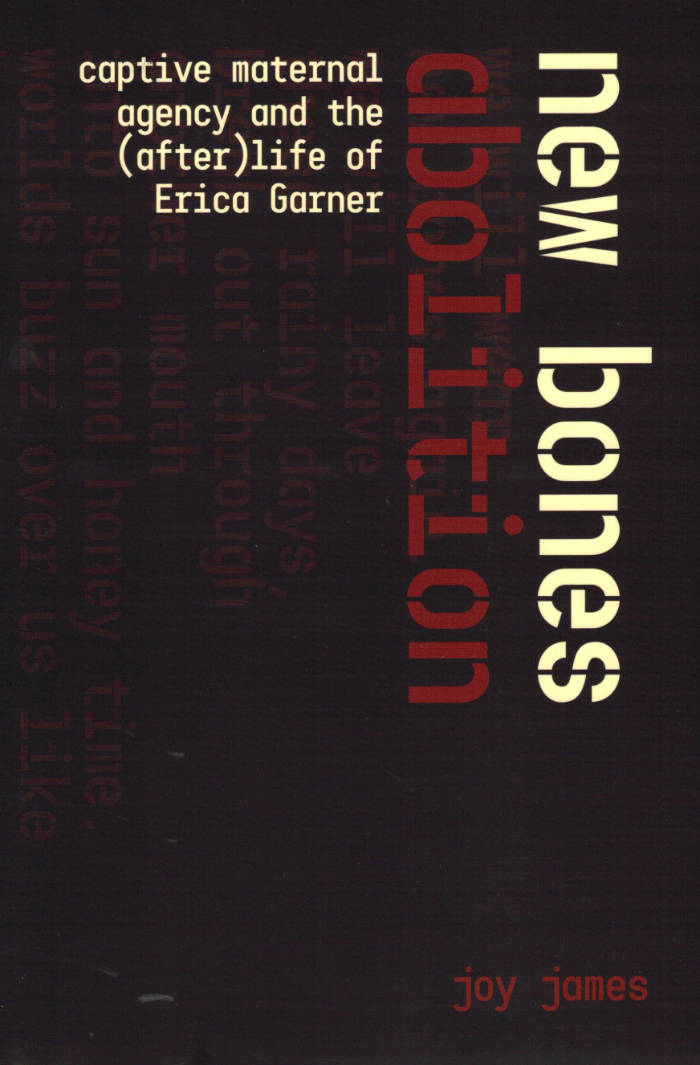
New Bones Abolition: Captive Maternal Agency and the (After)Life of Erica Garner
New Bones Abolition addresses "those of us broken enough to grow new bones" in order to stabilize our political traditions that renew freedom struggles.
Reflecting on police violence, political movements, Black feminism, Erica Garner, Mumia Abu-Jamal, caretakers and compradors, Joy James analyzes the "Captive Maternal," which emerges from legacies of colonialism, chattel slavery and predatory policing, to explore the stages of resistance and communal rebellion that manifest through war resistance. She recognizes a long line of gendered and ungendered freedom fighters, who, within a racialized and economically-stratified democracy, transform from coerced or conflicted caretakers into builders of movements, who realize the necessity of maroon spaces, and ultimately the inevitability of becoming war resisters that mobilize against genocide and state violence.
New Bones Abolition weaves a narrative of a historically complex and engaged people seeking to quell state violence. James discusses the contributions of the mother Mamie Till-Mobley who held a 1955 open-casket funeral for her fourteen-year-old Emmett Till, murdered by white nationalists; the 1971 rebels at Attica prison; the resilience of political prisoners despite the surplus torture they endured; the emergence of Black feminists as political theorists; human rights advocates seeking abolition; and the radical intellectualism of Erica Garner, daughter of Eric Garner slain in 2014 by the NYPD. James positions the Captive Maternal within the evolution of contemporary abolition. Her meditation on, and theorizing of, Black radicals and revolutionaries works to honor Agape-driven communities and organizers that deter state/police predatory violence through love, caretaking, protest, movements, marronage, and war resistance.
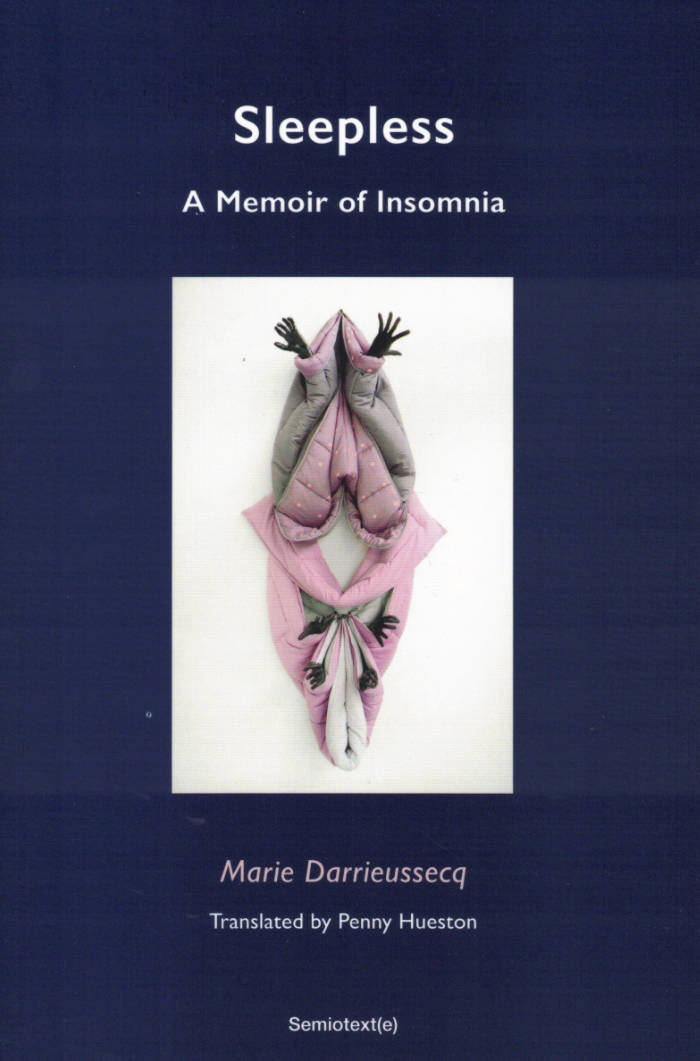
Sleepless: A Memoir of Insomnia
A restless inquiry into the cultural and psychic sources of insomnia by one of contemporary French literature's most elegant voices.
Plagued by insomnia for twenty years, Marie Darrieussecq turns her attention to the causes, implications, and consequences of sleeplessness: a nocturnal suffering that culminates at 4 a.m. and then defines the next day. “Insomniac mornings are dead mornings,” she observes. Prevented from falling asleep by her dread of exhaustion the next day, Darrieussecq turns to hypnosis, psychoanalysis, alcohol, pills, and meditation. Her entrapment within this spiraling anguish prompts her inspired, ingenious search across literature, geopolitical history, psychoanalysis, and her own experience to better understand where insomnia comes from and what it might mean. There are those, she writes, in Rwanda, whose vivid memories of genocide leave them awake and transfixed by complete horror; there is the insomnia of the unhoused, who have nowhere to put their heads down. The hyperconnection of urban professional life transforms her bedroom from a haven to a dormant electrified node.
Ranging between autobiography, clinical observation, and criticism, Sleepless is a graceful, inventive meditation by one of the most daring, inventive novelists writing today.

Firestar
«Avec Firestar, AD Rose tire une balle dans les jambes de celleux qui regardent leurs pieds» *
Une écriture dont le style évoque le rap, avec ses rimes, sa part de violence, de néologismes et d’égotrip, outil de lutte contre les injustices et l’ordre établi, celui de la langue comme celui de l’inceste. AD a 22 ans lorsqu’il quitte sa famille, écrit Firestar et nous accorde sa confiance pour le publier. Un travail testimonial rare sur les violences intra-familiales à la racine des systèmes de domination, un attentat poétique pour ne pas oublier.Lorsqu’en 2021 sa mémoire traumatique se réveille, AD Rose tente d'obtenir réparation auprès de ses parents, coupables de l'avoir incestué. Face au mur d’omerta auquel il se heurte, il trouve pouvoir dans l’écriture. Comme un réflexe de survie pour crier, sans demander la permission, libéré de la honte et des secrets. Un mouvement sans concession pour reprendre sa vie.
* Le texte est accompagné d’une préface de Victoria Xardel.
AD Rose est un poète français né en 1999. Il grandit dans le Tarn et le Tarn-et-Garonne, entre Vénès et Loze.
Victoria Xardel est une poète française née en 1987. Elle grandit en Alsace-Lorraine, entre Metz et Strasbourg.

18 Brum’Hair
Phœbe Hadjimarkos-Clarke, Martin Desinde
18 Brum’Hair est un recueil de poèmes écrits à quatre mains par Martin Desinde et Phœbe Hadjimarkos-Clarke au rythme du calendrier révolutionnaire. Si son titre fait référence—non sans un humour capillotracté—au coup d’État de Louis Bonaparte et au livre de Karl Marx traitant du dit-sujet, les auteur·ice·s écrivent ici en ping-pong sur notre temps présent et divaguent autour de sujets divers tels que l’état du monde, la vie urbaine, les drogues et l’alcool, la séduction, la sexualité, l’amour, le chagrin, l’amitié, la révolution... Ces 18 poèmes sont accompagnés de 12 allégories dessinées par Flore Chemin.
Un 18 brumaire littéraire, sans doute plus proche de la farce que de la tragédie.
Martin Desinde est auteur, éditeur et graphiste installé à Paris. Son travail fait dialoguer poésie et idéologie au travers de multiples formes: textes, objets éditoriaux, ready-mades, performances... Il fonde en 2017 la maison d'édition Dépense Défensive avec l’artiste Louis Somveille.
Phœbe Hadjimarkos-Clarke écrit des romans et des poésiesoù elle explore la vie organique et sentimentale au temps du capitalisme tardif. Elle vit dans de grandes villes et de petits villages.
Flore Chemin vit et travaille entre Paris et la Corrèze, sa pratique s’articule autour de la peinture, l’édition et l’installation. Elle y cultive une esthétique de l’à peu près qui répond à divers principes: faire d’abord / comprendre après, rester floue.s pour résister sous cape, inviter le monstre et les mauvaises herbes au cœur du jardin.
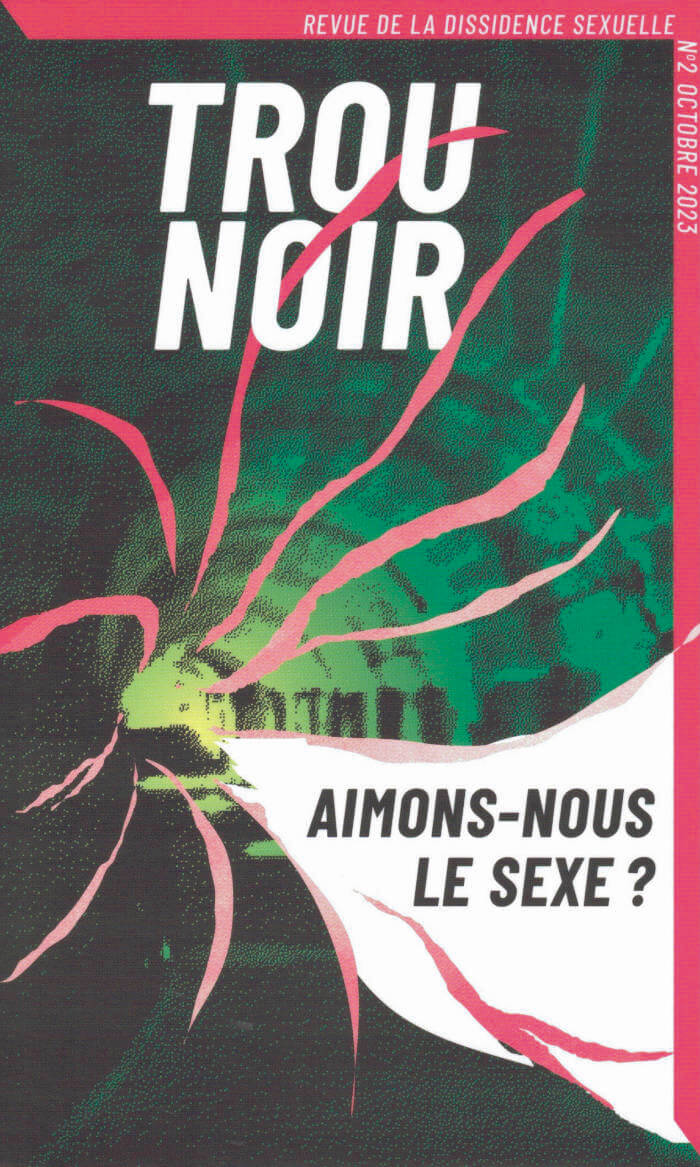
Trou noir, n°2 : Aimons-nous le sexe ?
Aimons-nous le sexe ? Ce numéro de Trou Noir cherche à explorer ce que le sexe et le politique auraient encore à fricoter ensemble, et à articuler nos paroles sans pour autant les faire se confondre. Bien sûr, répondre « oui » ou « non » à cette question ne relève pas de l’évidence et ne permettra pas de se situer sur une quelconque échelle de la dissidence sexuelle, mais y répondre quand même en allant puiser en soi-même, dans la littérature, dans la recherche, dans l’histoire, dans des expériences de groupe, dans toutes formes susceptibles de nous aider à penser le désir sexuel comme une résistance au pouvoir.
Sommaire
• Correspondance dans la galère de communiquer sur les insectes, le sexe et les faux problèmes – par L. Bigòrra & Brenda Walsh
• Ceci n’est pas une chatte – par Catalina Malabutch
• Fragments scatopolitiques – par Cy Lecerf Maulpoix
• Du sexe et des symbioses – par emma bigé
• Ça ressemble au sexe – par Mickaël Tempête
• Queer cruising – par Gorge Bataille + Saram
• Le caractère destructeur de la sexualité – par Quentin Dubois
• Se dire prosexe – par val flores
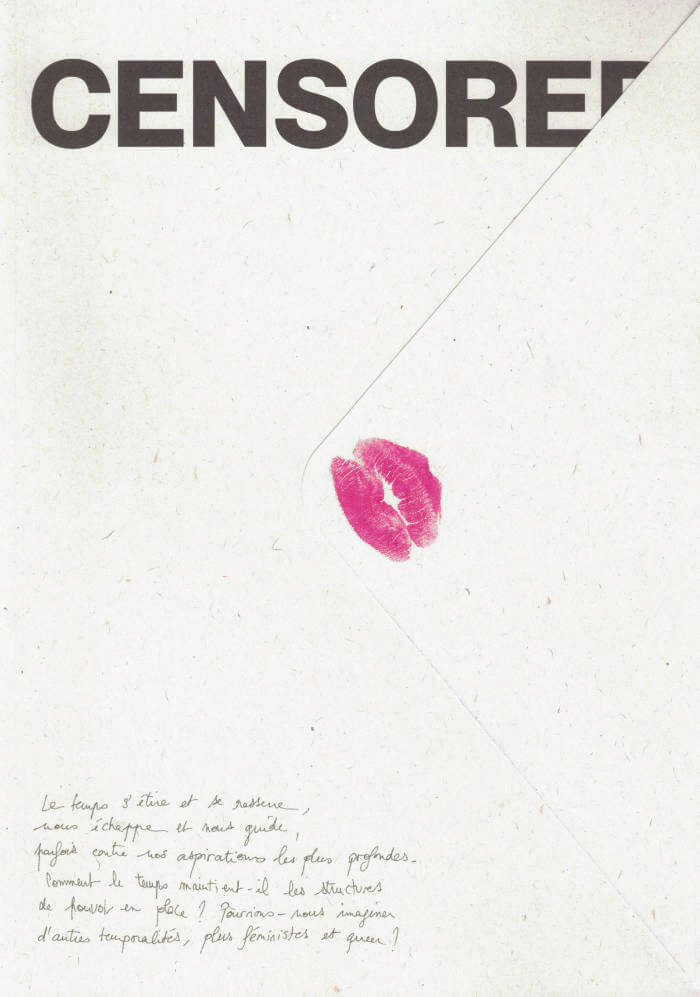
CENSORED 09 - It's About Time!
"Vous rappelez-vous de la dernière fois où vous vous êtes ennuyé·e ? Comment le temps maintient-il les structures du pouvoir en place ? Pourquoi la génération “working girl” ne fait-elle plus rêver ? Pourrions-nous imaginer d’autres temporalités, plus féministes et queer ? Dans son numéro “IT’S ABOUT TIME!” sous forme d’enveloppe géante, la revue Censored examine le concept du temps d’un point de vue féministe. Elle explore la manière dont le rythme de la vie est régi par des exigences sociales normées en abordant notre relation au travail, à la maternité, à la lutte et à la notion de liberté."
À travers des dialogues entre différentes époques, il explore des thèmes tels que la performance, les amitiés créatives et le repos et le divertissement. L’édition inclut des archives, dont un entretien entre Angela Davis et Toni Morrison, des lettres de plusieurs auteurices et poét-esses contemporain·es, des analyses, séries de photos ainsi que cinq cartes blanches à des artistes.

Les Éditions des mondes à faire
« Du fric ou on vous tue ! »
« Du fric ou on vous tue ! : j’ignore qui avait pu écrire ça sur un mur, au début des années 1980, à Marseille, mais j’avais bien aimé cette menace de braqueur qui résonnait là comme une injonction plus générale à ceux qui tiennent les cordons de la Bourse. »
Une association de hors-la-loi révolutionnaires, ainsi pourrait-on qualifier le groupe Os Cangaceiros, qui prit ce nom en hommage aux bandits du Nordeste brésilien. Ce livre raconte l’histoire de cette bande de jeunes qui, refusant d’aller travailler, s’était organisée pour arnaquer les banques et prêter main-forte aux luttes qui secouaient alors les prisons, les usines et les banlieues.
Ce récit de première main peut être lu comme une contre-histoire de la décennie 1980, durant laquelle se mit en place le régime de gouvernance que nous subissons depuis.
Alèssi Dell’Umbria est l’auteur de : Histoire universelle de Marseille. De l’an mil à l’an deux mille (Agone, 2006) ; C’est de la racaille ? Eh bien, j’en suis ! À propos de la révolte de l’automne 2005 (L’Échappée, 2006) (réédité et augmenté sous le titre La Rage et la Révolte en 2010 par Agone) ; Échos du Mexique indien et rebelle(Rue des cascades, 2010) ; R.I.P. Jacques Mesrine (Pepitas de calabaza, 2011) ;Tarantella ! Possession et dépossession dans l’ex-royaume de Naples (L’œil d’or, 2016) ; Istmeño, le vent de la révolte. Chronique d’une lutte indigène contre l’industrie éolienne, Livre-DVD (Collectif des métiers de l’édition / Les éditions du bout de la ville, 2018) ; Antimatrix (La Tempête, 2021).

Guerre Sonore
Le sonore excède nos capacités de pensée, il traverse toutes les échelles de la réalité et de la vie sociale, et nous permet d’expérimenter par avance les menaces du futur proche : ce sont les hypothèses que déploie dans sa Guerre sonore le DJ, producteur de bass music et théoricien Steve Goodman, mieux connu sous le pseudo Kode9, et formé au sein de l’Unité de Recherché sur la Cyberculture (CCRU) aux côtés de Kodwo Eshun et Mark Fisher. Guidé par les leçons des sound-systems et des raves, défiant le partage entre philosophie et science-fiction, il compose avec ce livre une vaste fresque fractale, qui analyse les limites de l’audible et les puissances sensorielles et spéculatives de la vibration. Guerre sonore décrit comment la maîtrise des infrabasses et l’occupation de l’espace sensoriel sont devenus l’enjeu d’une bataille secrète mais généralisée où les gouvernements, les spécialistes du marketing, les designers et les technoscientifiques s’affrontent au matérialisme des basses fréquences des artistes et des populations.
Steve Goodman (alias Kode9) est un musicien, écrivain et artiste. Il est l’auteur du livre Guerre Sonore et il codirigé les ouvrages Unsound : Undead (Urbanomic Press, 2019) et Ø (Flatlines Press, 2021). Il a fondé les labels Hyperdub et Flatlines, produit 5 albums, dont deux avec le regretté Spaceape (Memories of the Future, 2006 et Black Sun, 2012) et 3 en solo (Nothing, 2015, Escapology, 2022, Astro-Darien, 2022), de nombreuses compilations de mix DJ ; il a co-compilé et remixé Diggin in the Carts (2018), une collection de musiques rares de jeux vidéo japonais. Il a aussi, entre autres choses, conçu des installations sonores pour la Hyundai Commission à la Tate Modern en 2018 et pour l’exposition sur l’intelligence artificielle More than Human en 2019, au Barbican de Londres.

Rage Assassine: Mettre Fin au Racisme
Avant que Black Lives Matter et #MeToo ne viennent secouer l’Amérique et le monde occidental, bell hooks montrait, dans cet essai incisif, que l’abolition du racisme et l’éradication du sexisme vont de pair. Sans le féminisme, la lutte antiraciste reste une affaire d’hommes. Sans l’antiracisme, le féminisme s’expose à servir de courroie aux logiques de domination raciale. L'autrice insiste sur le bien-fondé de la rage qui anime les masses populaires et la jeunesse noire et sur la nécessité d’en faire un moteur de changement social radical. Elle propose une théorie et une pratique révolutionnaires, dont la fin est une communauté solidaire fondée sur l’égalité réelle et la volonté de tou.te.s de travailler au changement.
Traduit de l'anglais par Ségolène Guinard.
GLORIA JEAN WATKINS, connue sous son nom de plume BELL HOOKS, née en 1952, est une intellectuelle, féministe, et militante étasunienne. Elle a publié plus de trente livres et de nombreux articles, et est apparue dans plusieurs films documentaires. Traduits dans de nombreuses langues, ses ouvrages sont considérés parmi les plus importants sur la question aux Etats-Unis et suscitent un réel engouement en France depuis quelques années. Les éditions divergences ont déjà traduit et publié trois de ses ouvrages dont La volonté de changer et A propos d'amour.

Masturbatory Reader (2nd edition)
This Masturbatory Reader asks three main questions.
1. What power and pleasure can we access through attending to the erotics of knowledge production?
2. How are the sites, systems and tools of knowledge-making designed to reiterate violent norms (and in turn, erase deviant practices)?
3. What could the making (and unmaking) of these systems allow us to imagine?
To unpack these questions the edition gathers 16 contributors across 136 pages, conjuring the thinking (wondering, studying, lusting, sweating, ranting) of an expanding chorus of references that sit distances apart, folded here between facing pages. A chorus calling to action, calling to theory, calling to bed.
Featuring D Mortimer, Wes Knowler, Biogal, Tallulah Griffith, Brooke Palmieri, Carl Gent, Sophie Mak-Schram, Alice Butler, Jessa Mockridge, Nat Pyper, Alton Melvar M Dapanas, Sammy Paloma, Donna Marcus Duke, and Ryan Boultbee, with a forward by Emily Pope.
“In this anthology, reading is cruising, and cruising is reading.” – Sam Moore, ‘The (Bad) Taste Test: Radical Acts of Queer (Self) Pleasure in The Masturbatory Reader’, Polyester Zine

Chesil Cliff House and other failures
Orbiting around the saddest house in the history of Grand Designs, Sam Moore’s Chesil Cliff House and other failures takes us to North Devon where, standing at the cliff’s edge, we meet Edward Short: a man with a Fred Perry shirt and a dream. Amongst a chorus of characters including Kevin Mcloud as Father Time, Moore by means of Short leads us into a study of creative failure, gender, and, ultimately, the desire to keep writing.
"I struggle to see anyone living here. It feels like a distorted wonder of the world, a cautionary tale. Something that could never have been lived in, but that had to be made."
About the author:
Sam is a writer, artist, and editor. They are the author of All my teachers died of AIDS (Pilot Press), Long live the new flesh (Polari Press), and Search history (Queer Street Press). They are one of the co-curators of TISSUE, a trans reading and publishing initiative based in London.
About A Series of Attempts:
This new series published by Sticky Fingers Publishing explores the essay form through the etymological root of essay: to try, trial or attempt. In 1508, French theorist Michel de Montaigne published a collection of 107 texts called Essais, described by his contemporaries as ‘self-indulgent and embarrassingly confessional.’ It is through these roots we find the attitude and intentions at the heart of this series; that through thinking together, through trying to figure it out on the page, we can reach new and increasingly nuanced ways to understand each other and the worlds we inhabit.

I love you forever is murder
Here, in a work of trans pessimism, amy etherington asks what love and grief mean in a world that wants you dead. Speaking to a structural, architectural violence, I love you forever is murder imagines transness as an exit, which then implies a reentry. Understanding love and grief as inextricably entangled, etherington examines how trans people are often met with grief by those who claim they love them.
Part break-up text, part grief-oriented trans theory, part whispering, pricking, ghostly presence-from-beyond-the-grave, etherington calls upon Lacan through Edelman, Freud, Derrida, and the voices of friends, writing with an aching warmth and confessional intimacy that seeks to live, write, go on, after your own passing.
About the Author
amy etherington is an educator–researcher–writer, exploring grief, death and transness and how they sit by the edges of things. Her writing feels through/with a pessimism that there might only be no place for transexuals in this World, itself an imagining wrought from our violent unmaking. Her teaching work seeks ways to resist the institution a little longer from within its grounds, through collaborative investigation of care and caring practices with students. @amy.ether
About a Series of Attempts:
This new series published by Sticky Fingers Publishing explores the essay form through the etymological root of essay: to try, trial or attempt. In 1508, French theorist Michel de Montaigne published a collection of 107 texts called Essais, described by his contemporaries as ‘self-indulgent and embarrassingly confessional.’ It is through these roots we find the attitude and intentions at the heart of this series; that through thinking together, through trying to figure it out on the page, we can reach new and increasingly nuanced ways to understand each other and the worlds we inhabit.
Sticky Fingers Publishing is an intra-dependant press based in London. We are a feminist, queer, disabled-led publisher producing work at the intersection of design, academia, art, visual culture and performance.
.jpg)


FDBNHLLLTTFMOURNING
Tenth and final FDBN...* publication.
Featuring zack mennell, Biogal, James Sunderland, Fiona Glen, Jessie McLaughlin, Dan Schapiro, A Lyons, Stephanie Lones, Julian Konuk and Ioulitta Triantafyllou.
Guest edited by amy etherington.
Risograph and Thermography cover with flourecent green sticker black and white inners throughout.
*Fragile-Disorienting-Breakable-Naive-Hesitant-Loving-Lusting-Leaking-Trembling-Terrifying-Fucking-Mourning
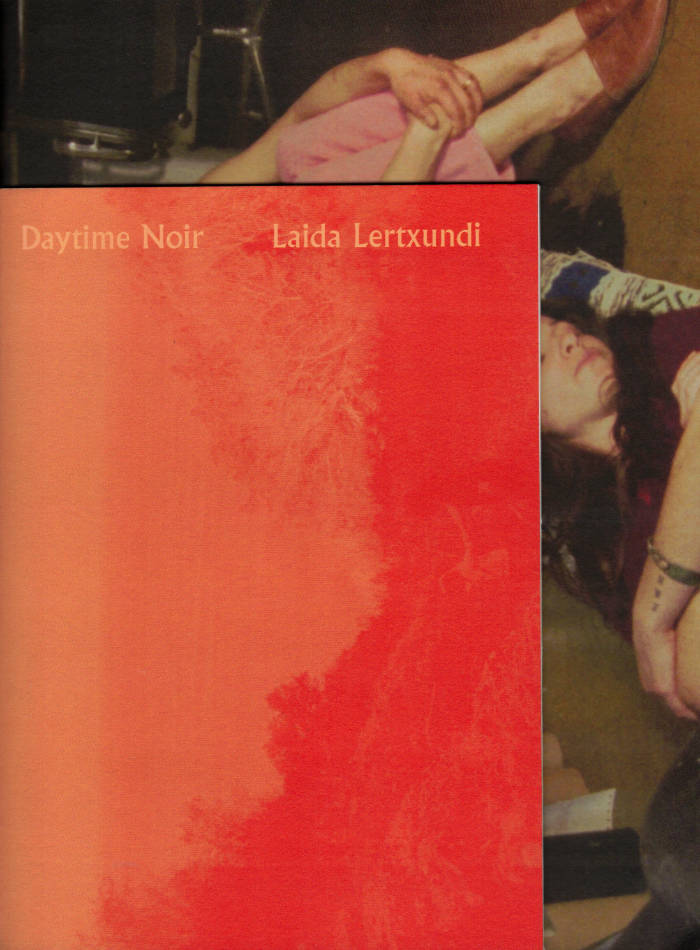
Daytime Noir
Daytime Noir is a limited edition artists book by Laida Lertxundi, designed by Gabrielle Pulgar and released by Artspace Aotearoa on the occasion of Scores for Transformation, the third in the cycle of exhibitions that orbit the question “where does my body belong?” The book includes new writing by Laida Lertxundi, Ren Ebel, and Luna Miguel.
Drawing on two recent 35mm films Autoficción (2020) and Inner Outer Space (2021) as well as recent works on paper, the pubilcation explores the parameters of what it takes to run an artistic practice navigating the many facets of a full life: parenting, teaching, exhibiting, working. The full colour, hand stitched book presents us with ‘film stills’ that come alive when we, as readers, engage with its physical form.
The pubilcation is an edition of 100.

Telling the Truth as It Comes Up: Selected Talks & Essays 1991-2018
An Expert Array of Talks & Essays by One of Our Greatest Living Poets.
One of our greatest living poets, Alice Notley, the author of more than 40 books of poetry, has delivered an expert array of talks and essays over the last three decades.
The publication offers a significant contribution to literature, reimagining the possibilities of writing in our time and the complicated business of how and why writers devote their lives to their craft. Whether she is writing about other poets—Ed Dorn, Allen Ginsberg, Homer, bpNichol, Douglas Oliver, or William Carlos Williams—noir fiction, the First Gulf War, dreams and what they're for, or giving us insight into her own work, Notley's observations are original, sobering, and always memorable. This collection often eschews the typical style of essay or lecture, resisting any categorization, and is consciously disobedient to academic structures in form. The results are thrilling new modes of thinking that may change the ways we read and write.
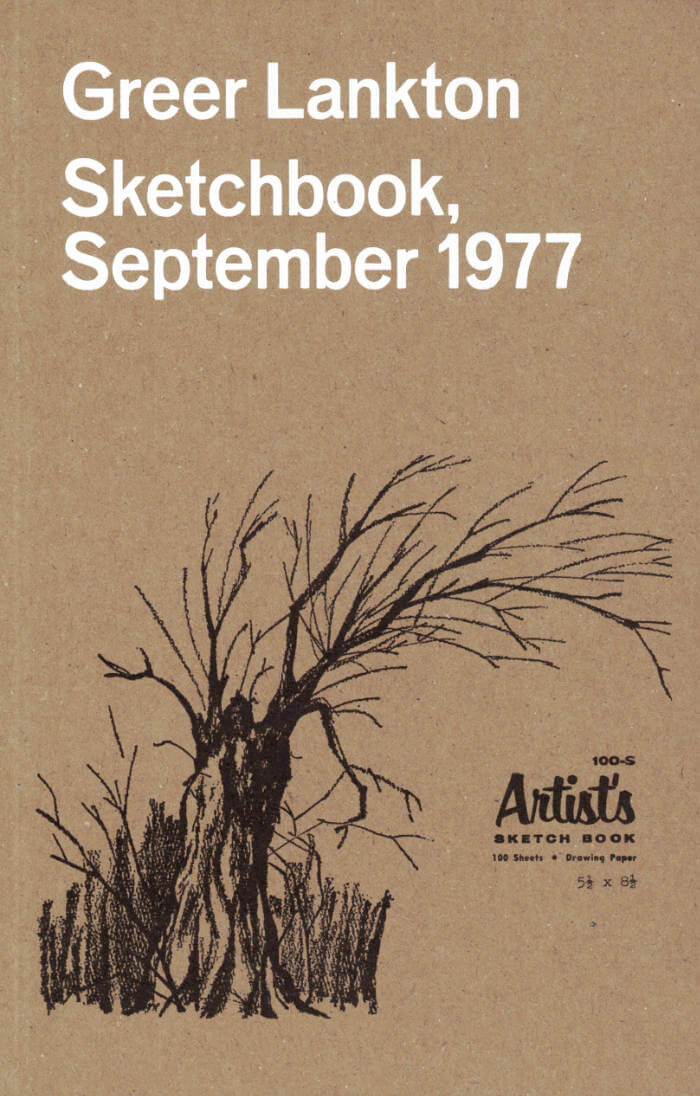
Greer Lankton: Sketchbook, September 1977
A fascinating account of Lankton's inquisitive, sociological and emotional ruminations in advance of her gender-affirming surgery.
This is one of the earliest of Greer Lankton's (1958-96) journals, sketchbooks and daybooks to appear in the artist's archives, and the first to be published in facsimile form. Written during her time as an art student at the School of the Art Institute of Chicago, the journal offers key insights into Lankton's mind at work before her career-defining move to New York in 1978, where she would become an important figure of the East Village art scene in the 1980s and early '90s with her lifelike dolls and theatrical sets.
Containing drawings, behavioral diagrams and aspirational, occasionally confessional writing, the journal is a record of imagining the body and mind reconciled through transformation. In these pages, the 19-year-old turns an inquisitive, sociological eye toward the emotional landscape and somatic effects of the days recorded here; days leading up to her decision to undergo hormone treatment and gender-affirming surgery in 1979. Lankton reflects with raw vulnerability and keen self-awareness on critical questions of self-image, social perception, gender normativity and human behavior.
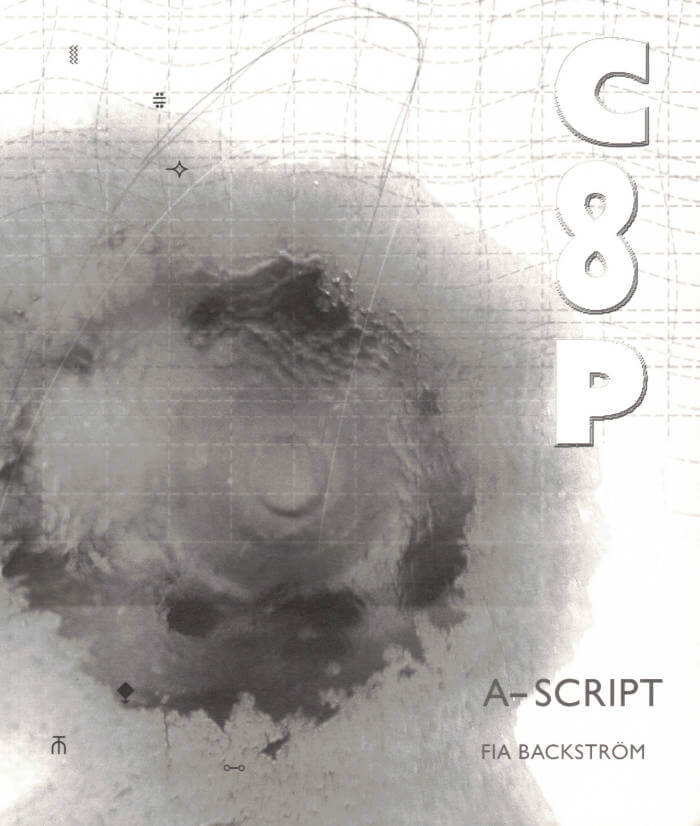
Fia Backström: COOP: A-Script
COOP documents Swedish artist Fia Backström's (born 1970) performances of two recent scripts, continuing her exploration of language, marketing, disorders and performance. The first script operates according to two distinct logics: a four-part linear base structure and text material that was chosen and read during the performance through chance movement of the performer's body across a grid.
This publication was especially designed to reflect this type of unpredictable and spontaneous movement. Mathematical symbols have been embedded into the text and these symbols link to ones on the upper corner of pages with nonlinear material. These indicate where the text could be inserted during a performance, thus incorporating the form of performance into the book. The second script serves as an epilogue to the first and was performed by four voices, reading from beginning to end without assigned lines, sometimes simultaneously.
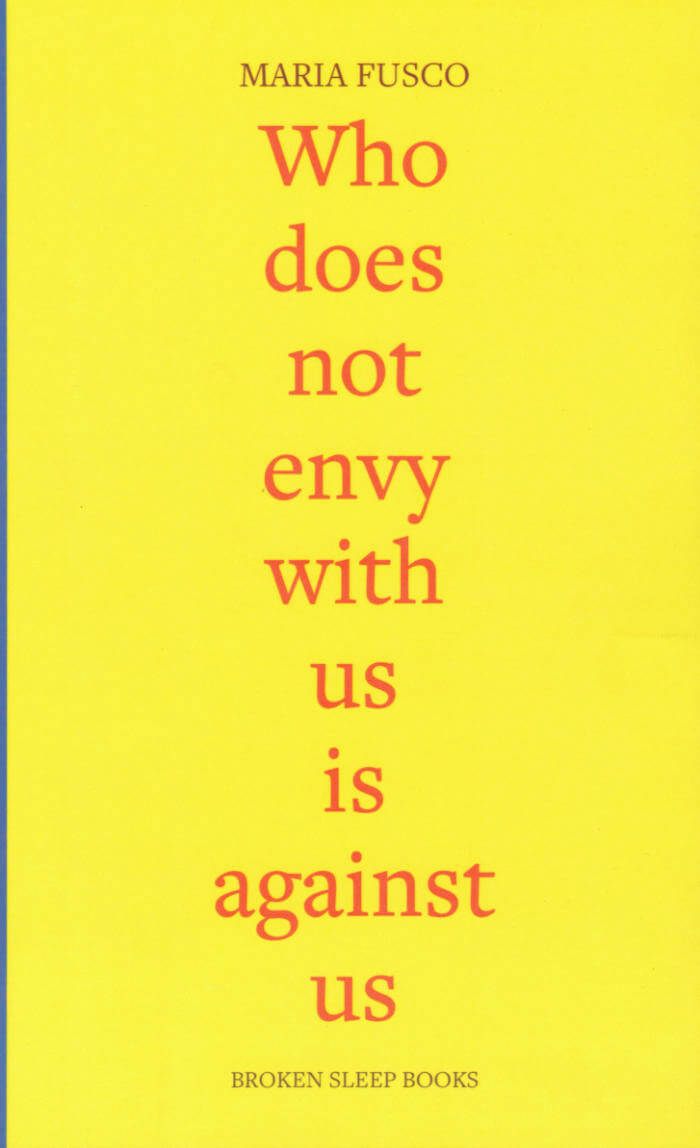
Who does not envy with us is against us: three essays on being working-class
Who does not envy with us is against us is a collection of essays on working-classness that demonstrates Maria Fusco's exceptional talent for weaving together the analytical and the poetic to create an affecting and profound work.
With expressive prose, Fusco deftly captures the experiences of the global working class, illuminating emotions that unite them across borders and lines. This is a tribute to the resilience and tenacity of working-class communities, and an invitation to readers to join in a deeper understanding of their struggles and triumphs. Through her masterful storytelling, Fusco utilises the power of language to elevate the voices of those who have long been silenced, creating a symphony of words that will echo long after the final page.
"I love this book with my entire life and beyond. Fact that I grew up a thousand miles south of Belfast, but, days after reading, feel like I'm - or should be - from there is testament to Fusco's analytic and lyric genius, and her ability to move and affect. Fusco mobilises a previously unnamed mood shared by the international, intergalactic working classes, I've never seen anything like it. Read this book." - Isabel Waidner, Corey Fah Does Social Mobility
.jpg)
Les déserteuses
The first novel by Swiss artist and writer Johana Blanc: haunted by woman figures having voluntarily ended their artistic career in the early 70', and fascinated by their radicality, a young artist asks herself how to carry on with her artistic practice without betraying her idols. Over the course of one evening, during which she attends a series of openings, the story follows her attempt to find her position among a fantasized art world, caught between a paradoxical reality and thwarted ambitions.
Johana Blanc (born 1990 in Paris), a graduate of the Head in Geneva, directs several micro-publishing projects such as the magazine Escalier and Éditions Cacahuète. Her artistic practices include installation and performance art. She also writes and has published several texts, whether collaboratively or not (Wages For Wages Against, Woman Cave).